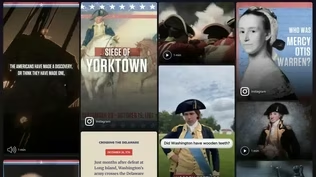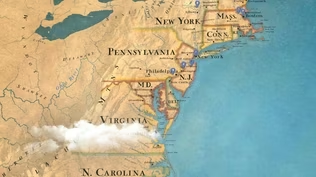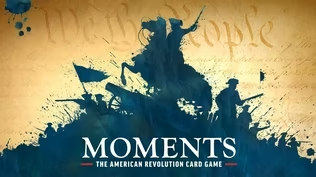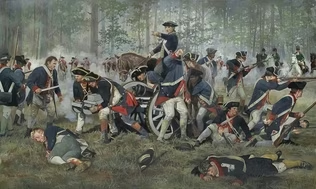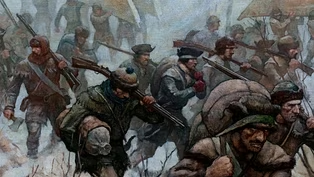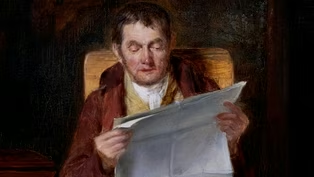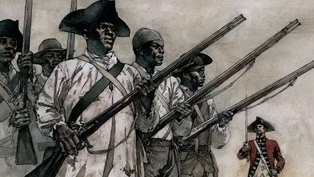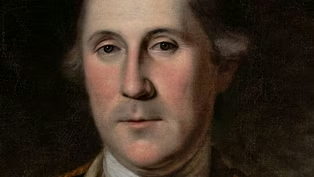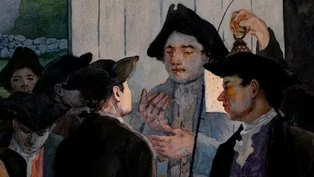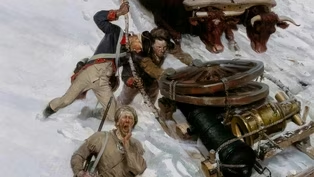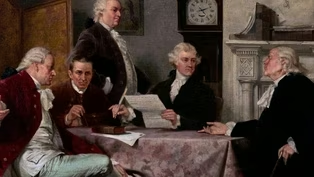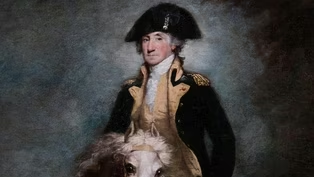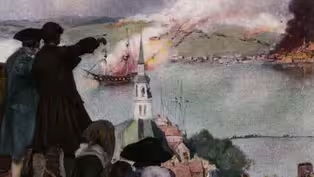
The Declaration of Independence & Birth of the United States
Clip: Episode 2 | 11m 47sVideo has Closed Captions
Thomas Jefferson writes the Declaration of Independence and proclaims all men are created equal.
Thomas Jefferson is tasked with writing a first draft of what will become the Declaration of Independence. In it, Jefferson writes that all men are created equal with inalienable rights to life, liberty and the pursuit of happiness. While proclaiming that all men are created equal is a revolutionary idea, it does not extend to Native Americans, women, or African Americans.
Problems playing video? | Closed Captioning Feedback
Problems playing video? | Closed Captioning Feedback
Episodes presented in 4K UHD on supported devices. Corporate funding for THE AMERICAN REVOLUTION was provided by Bank of America. Major funding was provided by The Better Angels Society and...

The Declaration of Independence & Birth of the United States
Clip: Episode 2 | 11m 47sVideo has Closed Captions
Thomas Jefferson is tasked with writing a first draft of what will become the Declaration of Independence. In it, Jefferson writes that all men are created equal with inalienable rights to life, liberty and the pursuit of happiness. While proclaiming that all men are created equal is a revolutionary idea, it does not extend to Native Americans, women, or African Americans.
Problems playing video? | Closed Captioning Feedback
How to Watch The American Revolution
The American Revolution is available to stream on pbs.org and the free PBS App, available on iPhone, Apple TV, Android TV, Android smartphones, Amazon Fire TV, Amazon Fire Tablet, Roku, Samsung Smart TV, and Vizio.
Buy Now
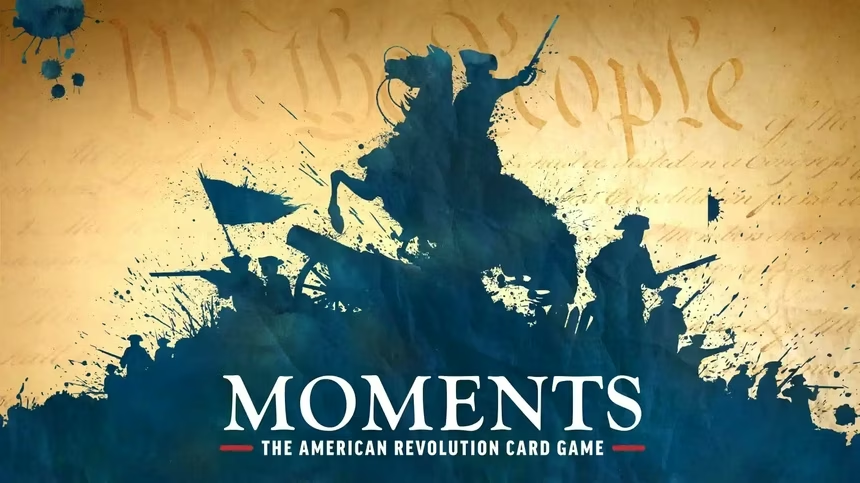
MOMENTS: The Revolutionary War Card Game
Use your knowledge of Revolutionary-era moments to build a timeline of real historical events.Providing Support for PBS.org
Learn Moreabout PBS online sponsorship[Gavel banging] Narrator: On June 7th, Richard Henry Lee of Virginia introduced resolutions in Congress declaring that "these United Colonies are & of right "ought to be free & independent States absolved from all allegiance to the British Crown."
♪ Meanwhile, a letter to a Pennsylvania newspaper signed only "Republicus" declared that it was time for independent Americans "to call themselves by some name"-- and proposed the "United States of America."
♪ A 5-man committee was named to produce a document setting forth the reasons for making such a momentous decision.
33-year-old Thomas Jefferson of Virginia was assigned to write the first draft.
♪ He would draw from Aristotle, Cicero, John Locke, and the Virginia Declaration of Rights, written by his friend George Mason.
But his goal, he said, was to distill what he called "an expression of the American mind."
♪ He worked in a rented room on Market Street, fueled by cups of tea brought to him by his 14-year-old valet Robert Hemings-- the son of an enslaved servant, Elizabeth Hemings, and Jefferson's father-in-law.
Voice: When in the course of human events, it becomes necessary for one people to dissolve the political bands which have connected them with another, and to assume among the powers of the earth the separate and equal station to which the laws of nature and of nature's God entitle them, a decent respect to the opinions of mankind requires that they should declare the causes which impel them to the separation.
♪ We hold these truths to be self-evident: that all men are created equal; that they are endowed by their Creator with certain inalienable rights; that among these are life, liberty, and the pursuit of happiness.
[Thomas Jefferson] Wood: Everything that we believe in comes out of the Revolution.
Our ideas of liberty, equality, it's the defining event of our history.
"All men are created equal."
That is the most famous and important phrase in our history.
If we don't celebrate it, we have no reason to be a people.
And Lincoln knew that.
And that's why he says, "All honor to Jefferson."
♪ Narrator: Thomas Jefferson was proposing something altogether new and radical in the world.
It was the American people's "right," he argued, it was "their duty"-- to "throw off" tyranny and learn to govern themselves.
Voice: That to secure these rights, governments are instituted among men, deriving their just powers from the consent of the governed, that whenever any form of government becomes destructive of these ends, it is the right of the people to alter or to abolish it, and to institute new government, laying its foundation on such principles and organizing its powers in such form, as to them shall seem most likely to effect their safety and happiness.
[Thomas Jefferson] Narrator: Since no one had authority over anyone else by birthright, Jefferson was affirming that all legitimate power came from the people themselves-- even if he, the owner of hundreds of human beings, could never make that truth a reality in his own life.
Gordon-Reed: His relationship to slavery is foundational.
From the beginning to the end, this institution bounded his life, even though he knew it was wrong.
How could you know something is wrong and still do it?
Well, that is the human question for all of us.
♪ Taylor: The Declaration of Independence, we remember it, primarily, from its opening preamble, the most famous sentences in our history, quoted ever since as a mandate for expanding liberty for other people.
But most of the document is something else.
It is a list of crimes allegedly committed by the King.
That means that when the Patriot leaders decide that they want independence, then they must persuade their people in the colonies, now states, that the King has forfeited his just authority.
The purpose of the Declaration of Independence is to declare the King is no longer sovereign.
Narrator: Throughout history, most people had been subjects, living under authoritarian rule.
"All experience hath shewn," Jefferson wrote, "that mankind are more disposed to suffer, while evils are sufferable."
George III himself, not the Parliament, was now the enemy.
The Declaration denounced him as "unfit to be the ruler of a free people," guilty of 18 "injuries and usurpations," all meant to establish, it read, "absolute tyranny."
It charged that he had invaded "the rights of the people," sent "swarms of officers to harass" them, imposed a standing army in peacetime, levied taxes without the colonists' consent, and was now waging war against them.
♪ [Thunder] Dunmore's Proclamation had deepened fears of slave uprisings, and reports that the governor of Canada had enlisted Native people to resist the invasion there further inflamed Congress.
In the 18th and final charge against the King, Jefferson did all he could to exploit their fury.
Voice: He has excited domestic insurrections amongst us and has endeavored to bring on the inhabitants of our frontiers, the merciless Indian Savages, whose known rule of warfare is an undistinguished destruction of all ages, sexes, and conditions.
[Thomas Jefferson] Narrator: Proclaiming the equality of "all men" was a genuinely revolutionary idea, but that equality was not yet extended to Native Americans, enslaved or free Blacks, the poor, or any woman.
Jefferson's original list of "injuries" had also included the charge that George III was somehow responsible for the Atlantic slave trade.
He called it "cruel war against human nature itself."
The other delegates refused to adopt that charge.
♪ The Declaration of Independence was formally ratified on July 4th, 1776-- just 1,337 words that ended with the phrase "We mutually pledge to each other our lives, our fortunes, and our sacred honor."
♪ When Rhode Island delegate Stephen Hopkins, who had palsy, signed the document, he is said to have remarked, "My hand trembles, but my heart does not."
[Crowd cheering] It was first read aloud to a cheering crowd in the State House yard at Philadelphia on July 8th.
It was soon published in 29 newspapers, and greeted by parades and celebratory volleys of gunfire throughout the newly United States.
[Gunfire] Voice: Boston, Massachusetts-- when Colonel Crafts read the proclamation, great attention was given to every word, and every face appeared joyful.
The King's arms were taken down from the State House and every vestige of him from every place in which it appeared and burned in King Street.
Thus ends royal authority in this state, and all the people shall say "Amen."
Abigail Adams.
[Crowd cheering] Narrator: On July 9th, in New York, General Washington ordered the Declaration read to his troops.
Hearing the list of George III's alleged crimes so angered the men that a number of them raced down Broadway to Bowling Green, tied ropes to the statue of the King, and pulled it to the ground.
♪ Pieces of the shattered statue were dispatched by wagon to Litchfield, Connecticut, where Patriots melted the gilded lead into bullets-- 42,088 of them.
♪ Far to the north at Fort Ticonderoga, the battered survivors of the failed invasion of Canada were assembled so that the Declaration could be read to them.
When it was over, an eyewitness said, "The language of every man's countenance was, "Now we are a people; we have a name among the states of the world."
♪ Among those who heard the Declaration read at Ticonderoga was private Lemuel Haynes, a free African-American from Granville, Massachusetts.
He understood right away what it might mean for people like him, and wrote an essay entitled "Liberty Further Extended."
♪ Voice: Liberty is a jewel which was handed down to man from the cabinet of heaven.
It hath pleased God to make "of one blood all nations of men for to dwell upon the face of the earth."
And as all are of one species, therefore, we may reasonably conclude that liberty is equally as precious to a Black man as it is to a White one, and bondage equally as intolerable to the one as it is to the other.
[Lemuel Haynes] Maggie Blackhawk: The Declaration of Independence was deeply significant to people at the margins.
It gave them a space of moral argument.
It gave them a space of legal argument that could be leveraged to reshape United States democracy and become a part of it.
And we are going to push every lever we had to be able to make this democracy real, and to make these visions, these values real rather than hypocritical.
♪
Video has Closed Captions
Clip: Ep2 | 8m 18s | Benedict Arnold's army braves the fierce winter to attack Quebec City in Canada. (8m 18s)
"Common Sense" and the Birth of a New World
Video has Closed Captions
Clip: Ep2 | 6m 36s | "Common Sense" awakens the American colonies to the idea of true independence. (6m 36s)
Dunmore's Proclamation & Black Americans in the Revolution
Video has Closed Captions
Clip: Ep2 | 9m 20s | Royal governor Lord Dunmore offers freedom to enslaved people that fight their Patriot masters. (9m 20s)
George Washington: Farmer, Patriot, Commander
Video has Closed Captions
Clip: Ep2 | 4m 56s | George Washington assumes command of the Continental Army and must turn it into a unified force. (4m 56s)
John Peters... an enemy to Congress?
Video has Closed Captions
Clip: Ep2 | 2m 5s | John Peters was the most respected man in his small settlement until the First Continental Congress. (2m 5s)
One of the Most Extraordinary Expeditions in American History
Video has Closed Captions
Clip: Ep2 | 6m 56s | Henry Knox leads a daring expedition to deliver artillery from Fort Ticonderoga to Boston. (6m 56s)
Preview: An Asylum for Mankind
Video has Closed Captions
Preview: Ep2 | 30s | Washington takes command of the Continental Army. Congress declares American independence. (30s)
Video has Closed Captions
Clip: Ep2 | 52s | Extolling Washington's qualities in leadership, command and mental faculties. (52s)
Bunker Hill Aftermath, June 17, 1775
Video has Closed Captions
Clip: Ep2 | 57s | On June 17, 1775, the British took the high ground, but at tremendous cost. (57s)
Providing Support for PBS.org
Learn Moreabout PBS online sponsorshipSupport for PBS provided by:
Episodes presented in 4K UHD on supported devices. Corporate funding for THE AMERICAN REVOLUTION was provided by Bank of America. Major funding was provided by The Better Angels Society and...

